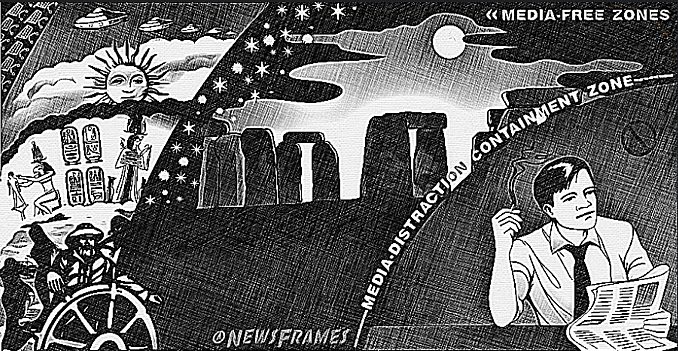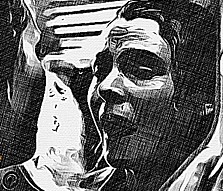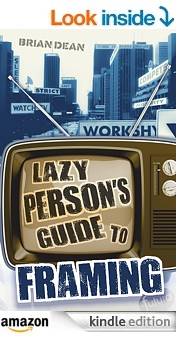Media distancing – word as virus

April 2020 – I recommend the practice of ‘media distancing’ for your psychological well-being. — (Just as social distancing is advised for physical well-being). — It’s the opposite of having your head in the sand, and there’s an art to it.
Continual exposure to the news (including large sections of social media) doesn’t make us safe – it mostly just increases anxiety. I strongly encourage avoiding unnecessary exposure to certain types of “news” prevalent at the moment – although the types you might better avoid (and the evaluation of “necessary” vs “unnecessary”) will be personal, given that everyone reacts differently.
Example: I was recently exposed – inadvertently and unfortunately – to a “news” item posted by Derbyshire police on social media. It showed their drone footage of a couple walking their dog in the Peak District. The Derby police publicly shamed this couple for walking in a remote location – an activity they brand as “NOT ESSENTIAL” (in the context of government rules to prevent virus spread). Seeing this strangely authoritarian video posted by police definitely increased my background anxiety for several hours. For reference, here is a link to a BBC piece about the police video and critical responses to it – if you’re feeling masochistic.
 (I finally managed to get some light relief from this stuff by relaxing with Alien: Covenant – Ridley Scott‘s vivid apocalyptic film-nightmare about evil spores which inevitably get into your body and then rapidly grow into predatory alien things which viciously eat their way out of your stomach or chest when you least expect it!)
(I finally managed to get some light relief from this stuff by relaxing with Alien: Covenant – Ridley Scott‘s vivid apocalyptic film-nightmare about evil spores which inevitably get into your body and then rapidly grow into predatory alien things which viciously eat their way out of your stomach or chest when you least expect it!)
Not that I want to make any sweeping generalisations about media coverage. That way lies Trump-style idiocy and anti-“MSM” populism. You don’t have to believe that the news media is uniformly bad to practice avoiding it. But if you do need more incentive to curb your news-consuming habit, consider the following (from Rolf Dobelli’s article, News is bad for you):
News has no explanatory power. News items are bubbles popping on the surface of a deeper world. Will accumulating facts help you understand the world? Sadly, no… The more “news factoids” you digest, the less of the big picture you will understand…
News is toxic to your body. It constantly triggers the limbic system. Panicky stories spur the release of cascades of glucocorticoid (cortisol). This deregulates your immune system…
News inhibits thinking. Thinking requires concentration. Concentration requires uninterrupted time. News pieces are specifically engineered to interrupt you. They are like viruses that steal attention for their own purposes. News makes us shallow thinkers. But it’s worse than that. News severely affects memory…
News makes us passive. News stories are overwhelmingly about things you cannot influence… It grinds us down until we adopt a worldview that is pessimistic, desensitised, sarcastic and fatalistic.
Bottom line? You can probably reduce your consumption of “news” to a fraction of what it is at the moment, yet still stay informed on what you regard as essential information. That’s what I mean by ‘media distancing’ – you keep it at arm’s length away from your psyche, so to speak (mainly by avoiding it, having it switched off, etc). You thus reduce anxiety, which seems like a good outcome for everyone.
Several people I know are using this time to catch up on book reading. I am too (I’ve just finished William Gibson’s latest novel, ‘Agency’. Next is a re-read of Greg Goode’s ‘Standing as Awareness’).
(See also something I wrote for Anxiety Culture back in the 1990s, titled ‘Media-free zones’, which made some similar points to Dobelli’s piece linked above. Update: As a commenter below has kindly noted, there’s a longer version of Dobelli’s ideas about avoiding news here).


I’ve been waiting for this piece from you! What I hate are the news flashes which pop up on news channels, and even on my computer! I have turned to Rolf Dobelli’s article with relief, but I prefer the fuller version, “Avoid News:Towards a Healthy News Diet (https://web.archive.org/web/20130117104220/http://dobelli.com/wp-content/uploads/2010/08/Avoid_News_Part1_TEXT.pdf). The Derbyshire Police video made me angry, and I like the fact that Lord Sumpter, former justice of the Supreme Court, has called them out. I find it best to avoid TV news as much as possible. I read The Guardian , but sparingly.
John Dakin
April 1, 2020 at 1:30 pm
Thanks, John – I wasn’t aware of that longer Dobelli piece (which I’ve now added as a link in an update at the end of the post).
NewsFrames
April 1, 2020 at 1:53 pm
I can’t get the longer Dobelli article link to open. It constantly times out – is anyone else having the same issue?
richardfalvey555101905
April 7, 2020 at 3:15 pm
It seems okay for me at the moment, although it takes a while to load. (It’s a pdf file, which may cause issues for some browser/platforms).
NewsFrames
April 13, 2020 at 4:44 pm
I am also avoiding Twitter.
John Dakin
April 1, 2020 at 3:33 pm
The sad thing is that many people who feel isolated will turn to the media for comfort and assurance, because on the surface that’s what the presenters seem to offer. But it’s the last place to find comfort, especially the news. They’re better off watching quiz shows, soaps or films if they want reassuring sound of human company.
Linda M
April 1, 2020 at 4:21 pm
I have some sympathy with the police on this. They said afterwards that it was about minimising the demand on emergency services. If someone gets in trouble out in the wilds, then it places more strain on those services. They probably aslo don’t want to see hordes of people coming from places like London, with high infection rates, into their district, so it’s a protection of territory thing. But yeah, they mishandled it.
Joe
April 2, 2020 at 8:28 am
I have sympathy with them as well. And I understand the reasoning about not placing unnecessary strain on the rescue services, but this was a very low risk activity – the couple were simply taking their dog for a quiet walk. (I doubt whether they’d traveled all *that* far to take their dog out – they weren’t part of a mass exodus from the city).
You could understand the police getting annoyed about activities with a relatively high risk of needing help – like mountaineering in bad conditions. But not this. And you don’t need drone surveillance invading people’s privacy to make a simple point about avoiding high-risk activity.
NewsFrames
April 2, 2020 at 8:54 am
Also, the Derbyshire Police were shaming people by their comments–an elderly couple walking a dog, with no one else near. I suspect this may be a result of hastily drafted legislation, which gave power to local authorities and police forces to enforce the legislation as they see fit, with no central scrutiny. The legislation itself, I believe, was not subjected to proper scrutiny in Parliament.
John Dakin
April 2, 2020 at 5:21 pm
It’s worth pointing out that Rolf Dobelli in the article cited advises abstaining from “news” altogether. Difficult if you live in a household in which some people like watching the news.
John Dakin
April 4, 2020 at 5:57 pm
I am old enough to remember when the news was at 6pm for 10 minutes; there was the “Tonight” program, and then “Panorama” was once a week. Now we have 24 hour news channels. Are we better informed? I wonder.
John Dakin
April 4, 2020 at 6:03 pm
And much of social media is a commentary on – or mere regurgitation of – “the news”. A lot of people seem plugged into this ‘feed’ all day long via their phones. That would turn me into a gibbering wreck.
NewsFrames
April 5, 2020 at 2:28 pm
The article Media-Free Zones attributes the idea of words as virus to W.S. Burroughs; I would be interested in knowing where Burroughs talks about this.
John Dakin
April 6, 2020 at 4:26 pm
“The word is now a virus. … Try halting sub-vocal speech. Try to achieve even ten seconds of inner silence. You will encounter a resisting organism that forces you to talk. That organism is the word.” (The Ticket that Exploded)
Burroughs also says somewhere that language is “a virus from outer space”. Searching for “word as virus” or “language is a virus”, combined with ‘Burroughs’, should give you relevant links.
buzzmike
April 7, 2020 at 11:54 am
Thank you very much.
John Dakin
April 7, 2020 at 12:30 pm
Interesting comment from Simon Jenkins in today’s Guardian. “Of course, media exposure can be the problem as much as the solution. An addiction to human interest and bad news leaves worst-case scenarios and personal tragedies hogging the headlines. The BBC’s News at Ten has become unwatchable for its vox pops of random anguish, merely boosting the government’s message: obey or die. The promotion of fear gets people watching, but it never aids public understanding. Just now, the yawning chasm between known and unknown is too susceptible to the politics of terror.”
John Dakin
April 24, 2020 at 7:11 pm